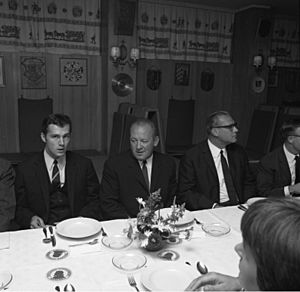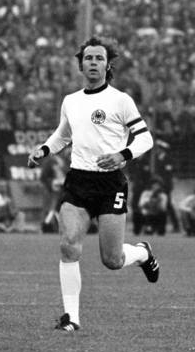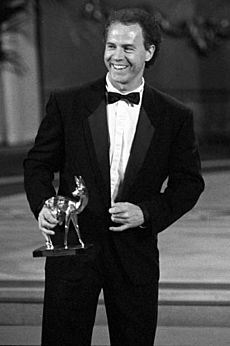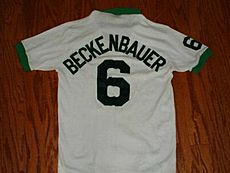Franz Beckenbauer facts for kids
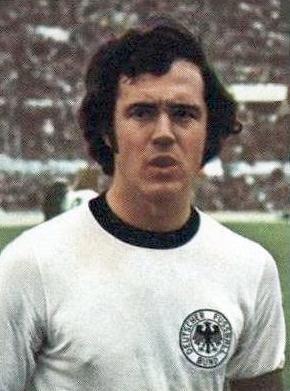
Beckenbauer with West Germany in 1975
|
||||||||||||||||||||||||||||||||||||||||||||||
| Personal information | ||||||||||||||||||||||||||||||||||||||||||||||
|---|---|---|---|---|---|---|---|---|---|---|---|---|---|---|---|---|---|---|---|---|---|---|---|---|---|---|---|---|---|---|---|---|---|---|---|---|---|---|---|---|---|---|---|---|---|---|
| Full name | Franz Anton Beckenbauer | |||||||||||||||||||||||||||||||||||||||||||||
| Date of birth | 11 September 1945 | |||||||||||||||||||||||||||||||||||||||||||||
| Place of birth | Munich, Germany | |||||||||||||||||||||||||||||||||||||||||||||
| Date of death | 7 January 2024 (aged 78) | |||||||||||||||||||||||||||||||||||||||||||||
| Place of death | Salzburg, Austria | |||||||||||||||||||||||||||||||||||||||||||||
| Height | 1.81 m (5 ft 11 in) | |||||||||||||||||||||||||||||||||||||||||||||
| Position(s) | Defender | |||||||||||||||||||||||||||||||||||||||||||||
| Youth career | ||||||||||||||||||||||||||||||||||||||||||||||
| 1951–1959 | München von 1860 | |||||||||||||||||||||||||||||||||||||||||||||
| 1959–1964 | Bayern Munich | |||||||||||||||||||||||||||||||||||||||||||||
| Senior career* | ||||||||||||||||||||||||||||||||||||||||||||||
| Years | Team | Apps | (Gls) | |||||||||||||||||||||||||||||||||||||||||||
| 1964–1977 | Bayern Munich | 427 | (60) | |||||||||||||||||||||||||||||||||||||||||||
| 1977–1980 | New York Cosmos | 80 | (17) | |||||||||||||||||||||||||||||||||||||||||||
| 1980–1982 | Hamburger SV | 28 | (0) | |||||||||||||||||||||||||||||||||||||||||||
| 1983 | New York Cosmos | 25 | (2) | |||||||||||||||||||||||||||||||||||||||||||
| Total | 560 | (79) | ||||||||||||||||||||||||||||||||||||||||||||
| International career | ||||||||||||||||||||||||||||||||||||||||||||||
| 1964 | West Germany Youth | 3 | (3) | |||||||||||||||||||||||||||||||||||||||||||
| 1965 | West Germany B | 2 | (0) | |||||||||||||||||||||||||||||||||||||||||||
| 1965–1977 | West Germany | 103 | (14) | |||||||||||||||||||||||||||||||||||||||||||
| Managerial career | ||||||||||||||||||||||||||||||||||||||||||||||
| 1984–1990 | West Germany | |||||||||||||||||||||||||||||||||||||||||||||
| 1990–1991 | Marseille (sport director) | |||||||||||||||||||||||||||||||||||||||||||||
| 1993–1994 | Bayern Munich | |||||||||||||||||||||||||||||||||||||||||||||
| 1996 | Bayern Munich | |||||||||||||||||||||||||||||||||||||||||||||
|
Medal record
|
||||||||||||||||||||||||||||||||||||||||||||||
| *Club domestic league appearances and goals | ||||||||||||||||||||||||||||||||||||||||||||||
Franz Anton Beckenbauer (born 11 September 1945 – died 7 January 2024) was a famous German football player and manager. People called him "Der Kaiser", which means "The Emperor". He was a very flexible player. He started as a midfielder, but became famous as a central defender.
Many people say he created the role of the modern sweeper (called libero in Italian). This player defends but also joins in attacks. Beckenbauer is one of only nine players to win the FIFA World Cup, the European Champions Cup, and the Ballon d'Or.
He won the European Footballer of the Year award twice. Beckenbauer played 103 games for West Germany. He played in three FIFA World Cups and two European Championships. He is one of only three men to win the World Cup as both a player and a manager. He lifted the World Cup trophy as captain in 1974. Then, he won it again as a manager in 1990.
He was the first captain to win both the World Cup and the European Championship for his country. He also won the European Cup with his club team. He was named in the World Team of the 20th Century in 1998. In 2004, he was listed in the FIFA 100 as one of the world's greatest living players.
With his club, Bayern Munich, Beckenbauer won the European Cup Winners' Cup in 1967. He also won three European Cups in a row from 1974 to 1976. This made him the first player to win three European Cups as his club's captain. Later, he became a team manager and then president of Bayern Munich. He also played for the New York Cosmos in the USA. He was later added to the U.S. National Soccer Hall of Fame.
Beckenbauer helped Germany win the bid to host the 2006 FIFA World Cup. He also led the organizing committee for the event.
Contents
Early Life and Football Beginnings
Franz Beckenbauer was born in Munich, Germany, after World War 2. He was the second son of Franz Beckenbauer, Sr., who worked for the postal service. He grew up in a working-class area called Giesing.
Even though his father wasn't keen on football, Franz started playing at age nine. He joined the youth team of SC Munich '06 in 1954. He first played as a forward. He looked up to Fritz Walter, who won the 1954 FIFA World Cup. Franz also supported his local team, 1860 Munich.
He really wanted to play for 1860 Munich. But in 1959, he joined the Bayern Munich youth team instead. This happened after a youth tournament. His team, SC Munich '06, was going to join 1860 Munich. However, in the final match, there was a fight between Beckenbauer and an 1860 Munich player. Because of this bad feeling, Franz and his teammates decided to join Bayern's youth side.
Club Career Highlights
Beckenbauer played his first game for Bayern on 6 June 1964. It was a play-off match for promotion to the Bundesliga. In his first full season (1964–65), his team won their league. They were then promoted to the Bundesliga, Germany's top football league.
Bayern quickly became a strong team in the new German league. They won the German Cup in 1966–67. They also had success in Europe, winning the Cup Winners' Cup in 1967. Beckenbauer became the team captain for the 1968–69 season. He led his club to win their first league title.
Around this time, he started playing as a "sweeper" (libero). He made this role famous. He became known as one of the best attacking sweepers ever. During his time at Bayern Munich, the club won three league championships in a row. This was from 1972 to 1974. They also won the European Cup three times in a row (1974–76). This amazing achievement meant the club got to keep the trophy forever.
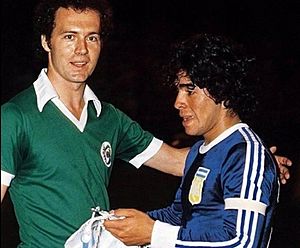
From 1968, fans and media started calling Beckenbauer Der Kaiser (The Emperor). One story says he posed next to a statue of an old Austrian emperor, Franz Joseph I. The media then called him the "football-emperor." Another story says it was because he played tricks on an opponent called "King of Westphalia." The press then called Beckenbauer "The Emperor" because it sounded even grander.
In 1977, Beckenbauer moved to the United States. He signed a big contract to play for the New York Cosmos. He played there for four seasons until 1980. His team won the Soccer Bowl three times (1977, 1978, 1980).
Beckenbauer retired after playing two years for Hamburger SV in Germany (1980–82). He won the Bundesliga title with them in 1982. He played one last season with the New York Cosmos in 1983. In total, he played in 754 club matches.
International Career with West Germany
Beckenbauer played 103 games for West Germany and scored 14 goals. He was part of the World Cup teams that finished second in 1966, third in 1970, and champions in 1974. He was also chosen for the tournament's best team in all three World Cups. He won the 1972 European Football Championship and was second in the 1976 tournament. His first game for the national team was on 26 September 1965.
1966 World Cup Journey
"The message he [Beckenbauer] sent out was: 'Don't even try it. Coming out to face me is a waste of your time.'
Beckenbauer played in his first World Cup in 1966. He played in every match. In his first World Cup game, against Switzerland, he scored two goals in a 5–0 win. West Germany won their group. Then, they beat Uruguay 4–0 in the quarter-finals. Beckenbauer scored the second goal.
In the semi-finals, Germany played against the USSR. Beckenbauer scored his fourth goal of the tournament. West Germany won and went to the final at Wembley Stadium against host country England.
Beckenbauer and England's Bobby Charlton were told to guard each other closely. This meant they both couldn't play their usual attacking game. England won the final in extra time. Even though Germany lost, Beckenbauer had a great tournament. He was one of the top goal scorers, even though he wasn't an attacker. The team was welcomed home as heroes.
1970 World Cup Challenge
West Germany won their first three matches. Then, they faced England again in the second round. England was leading 2–0 in the second half. But Beckenbauer scored a fantastic goal, helping Germany come back. They equalized and won the match in extra time.
West Germany moved to the semi-finals to play Italy. This game is known as the Game of the Century. Beckenbauer dislocated his shoulder during the match. But he kept playing because his team had already used all their substitutions. He played with his arm in a sling. Italy won the match 4–3 after extra time. Germany then beat Uruguay 1–0 to finish in third place.
1972 European Championship Victory
Beckenbauer became the captain of the national team in 1971. In 1972, West Germany won the European Championship. They beat the Soviet Union 3–0 in the final game.
1974 World Cup Triumph
The 1974 World Cup was held in West Germany. Beckenbauer led his team to victory. They had a tough 2–1 win over the strong Netherlands team, which included Johan Cruyff. Beckenbauer and his defenders marked Cruyff so well that the Dutch team couldn't play their famous "Total Football" style effectively.
Beckenbauer was the first captain to lift the new FIFA World Cup Trophy. Brazil had kept the old Jules Rimet Trophy in 1970. West Germany became the first European team to hold both the European Championship and World Cup titles at the same time. (France in 2000 and Spain in 2010 have done this since).
1976 European Championship Final
In the 1976 competition, West Germany reached the final again. They lost to Czechoslovakia in a penalty shootout. Beckenbauer was still named in the Team of the Tournament. He retired from international football in 1977, at age 31, after moving to the New York Cosmos.
Managerial Career and Leadership
When Beckenbauer returned to Germany, he became the manager of the West Germany national team. This was on 12 September 1984. He led the team all the way to the final of the 1986 World Cup. They lost to Diego Maradona's Argentina.
In 1990, Beckenbauer managed the last Germany national football team before Germany was reunified. They won the World Cup final 1–0 against Argentina. This was a rematch of the previous World Cup final. Beckenbauer became one of only three men to win the World Cup as both a player and a manager. He is also one of only two men to win it as both a team captain and a manager.
Beckenbauer then managed club teams. He joined Olympique de Marseille in 1990 but left within a year. Marseille won the French championship that season. From 1993 to 1994, and again in 1996, he managed Bayern Munich. During these short times, he won two more titles: the Bundesliga in 1994 and the UEFA Cup in 1996.
In 1994, Beckenbauer became the club president at Bayern. Many people say his smart leadership helped the club succeed in the years that followed. He stepped down as president of Bayern in 2009.
In 1998, Beckenbauer became vice-president of the German Football Association. He also led Germany's successful bid to host the 2006 FIFA World Cup. He was the head of the organizing committee for the World Cup.
Legacy and Impact
"Franz Beckenbauer symbolises football and a winning mentality. On top of that, he brought the World Cup to his own country. We're proud of him."
"He's the hero of our nation. It hasn't happened by chance, he's earned it by hard work."
Franz Beckenbauer is considered one of the greatest football players ever. He is the only defender in football history to win the Ballon d'Or award twice. He is often given credit for inventing the role of the modern sweeper, or libero. This is a defensive player who also helps with the team's attacks.
He was named European Footballer of the Year twice. Beckenbauer was chosen for the World Team of the 20th Century in 1998. He was also part of the FIFA World Cup Dream Team in 2002. He is a true icon in Germany.
Former German chancellor Gerhard Schröder praised Beckenbauer. He said Beckenbauer won the World Cup as a player in 1974. He won it again as a manager in 1990. He also played a big part in Germany hosting the 2006 World Cup.
Media Appearances
Beckenbauer was so popular that he was a character in a Monty Python comedy sketch. It was called "The Philosophers' Football Match." He was the only real football player in the German team. During the match, the "players" just walked around talking about philosophy. Beckenbauer was very confused.
In a 2013 advertisement for the company Samsung, Beckenbauer appeared as a manager. He managed a team of football players from around the world. He gave the captain's armband to Lionel Messi. Beckenbauer is also featured in EA Sports' FIFA video game series. He was in the FIFA 15 Ultimate Team Legends.
Personal Life and Health
Beckenbauer was married three times and had five children. One of his sons, Stephan, was also a professional footballer. Stephan sadly passed away on 31 July 2015, at age 46, after a long illness. Stephan's son, Luca, is also a professional footballer.
In 2016 and 2017, Beckenbauer had heart surgery twice. He also had an artificial hip put in during 2018.
Franz Beckenbauer died on 7 January 2024, at the age of 78. His family shared the news.
Honours and Awards
Player Achievements
Bayern Munich
- Regionalliga Süd: 1964–65
- Bundesliga: 1968–69, 1971–72, 1972–73, 1973–74
- DFB-Pokal: 1965–66, 1966–67, 1968–69, 1970–71
- European Cup: 1973–74, 1974–75, 1975–76
- European Cup Winners' Cup: 1966–67
- Intercontinental Cup: 1976
New York Cosmos
- North American Soccer League: 1977, 1978, 1980
Hamburger SV
- Bundesliga: 1981–82
West Germany National Team
- FIFA World Cup: 1974 (Winner); 1966 (Runner-up); 1970 (Third place)
- UEFA European Championship: 1972 (Winner); 1976 (Runner-up)
Managerial Achievements
West Germany National Team
- FIFA World Cup: 1990 (Winner)
Marseille
- Ligue 1: 1990–91
Bayern Munich
- Bundesliga: 1993–94
- UEFA Cup: 1995–96
Individual Awards
- Ballon d'Or: 1972, 1976
- Footballer of the Year (Germany): 1966, 1968, 1974, 1976
- FIFA World Cup Best Young Player Award: 1966
- FIFA World Cup All-Star Team: 1966, 1970, 1974
- NASL Most Valuable Player Award: 1977
- FIFA Order of Merit: 1984
- UEFA Euro Team of the Tournament: 1972, 1976
- World Team of the 20th Century: 1998
- FIFA World Cup Dream Team: 2002
- FIFA 100: 2004
- Laureus Lifetime Achievement Award: 2007
- Golden Foot: 2010 (as a football legend)
- FIFA Presidential Award: 2012
- UEFA President's Award: 2012
- World Soccer Greatest XI of All Time: 2013
- Ballon d'Or Dream Team: 2020
See also
 In Spanish: Franz Beckenbauer para niños
In Spanish: Franz Beckenbauer para niños
- List of men's footballers with 100 or more international caps
- List of UEFA Cup winning managers


